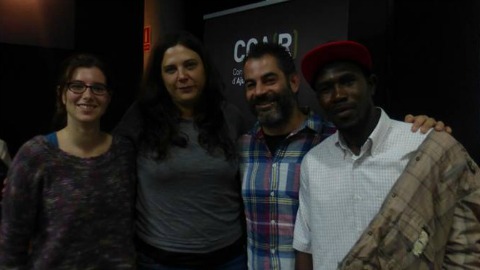The Land Between

13/11/2014
Yacou Traore and Aicha Barry are the voices through which the director of The Land Between David Fedele tells the story of the hundreds of people (mostly men, with the exception of two women, one of them, Aicha) at the Gurugú Mountain (near Nador, Morocco). An "extreme" life, says David Fedele, because it's the most peculiar forest in Morocco, being the place where those who definitely want to try to jump the militarized barrier in Melilla live in inhuman conditions and exposed to violence and surveillance.
This was explained by the director on Monday 17 November at an event organized by UAB Solidarity Foundation (FAS) and Cultura en Viu with the collaboration of the CCAR (Catalan Commission for Refugee Aid). Fedele also explained the process of making the documentary during ten months in Morocco, filming with the difficulties and dangers of being arrested by the Moroccan authorities.
Yacou Traore is one of the persons who agreed to be recorded and became the protagonist of the film. The end credits still place Yacou in the Gurugú Mountain, waiting to go across the barrier and make it, and so thought the 100 attendees of the projection on Monday 17 November. But the situation had changed since November 2013 when Fedele finished editing the film. Yacou Traore finally crossed the barrier. And after crossing the entire Spanish territory, he met again with the director and friend David Fedele and also with all the audience at the events room of The Agora Building, a shocking and exciting moment for the audience after the empathy produced by the film projection. Yacou Traore expressed his gratitude to David Fedele, whom he curiously hardly understands because they don’t speak fully each other’s language, and he also thanked the entities and people who have helped him.
Researchers and university professors contextualised migration in Europe. According to their explanation, “the documentary explains the flow of people by land, which is influenced because it means the movement of 65,000- 80,000 people”, besides the proximity with Melilla and the recent brutal assaults. Anyway, the majority of movements are by air.
Following that, members of the CCAR criticised the posture of European politics, which consists on the "creation of laws to regulate community migration but completely ignoring human needs".
Melilla's barrier, according to CCAR's member Estela Parela, "is an example of a human drama". "We torture and murder under a supposed security", affirmed Pareja. To face this reality, the CCAR has launched the campaign "Esto hay que cortarlo" (We have to stop this), to collect signatures and send a petition to the Spanish Prime Minister.